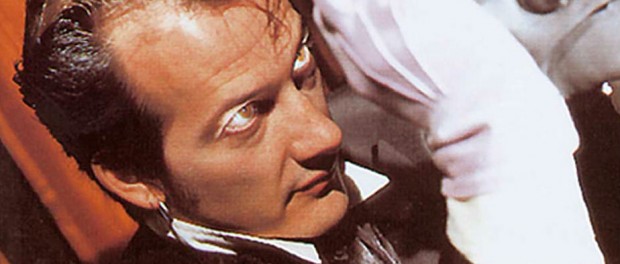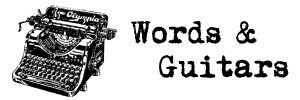A Ghost In This House: Barry Hutchinson interviewed
New book sheds light on Damned vocalist Dave Vanian's side-project.

While the library shelves creak with all manner of punk-related biographies and photo books, there’s only one book about The Damned: the late Carol Clerk’s Light At The End Of The Tunnel, published around the time of the band’s tenth anniversary.
30 years down the line and long-term acolyte Barry Hutchinson is looking to put that wrong right with his long-awaited, career-spanning biography – but as a stop-gap, he recently self-published After The Lights Go Out: a Biography of The Phantom Chords, a rumble through the tempestuous career of Damned vocalist Dave Vanian’s rock’n’roll influenced late 80s/early 90s side-project.
It’s a breezy read, detailing the ups and (mostly) downs of the band’s lifespan, typified in one anecdote by Vanian’s decision to hire his estate agent to briefly manage the band. The band recorded three albums – but released only one – a reminder in today’s more accepting context where nostalgia marketing is rife, that even singers in moderately famous acts once found securing deals and paying gigs hard going.
We caught up with Barry to learn more about the book and his future plans.
W&G: Tell me a little about how you discovered The Damned.
Barry Hutchinson: It was as a teenager, in 1985, that my musical interests were first awakened to 1970s punk/new wave after being given a compilation of punk anthems on cassette tape. One of the tracks was The Damned’s ‘Smash It Up’. Musically they just blew me away. I had never heard anything like it before. It just really appealed. As I explored their records I found that I loved everything about them: the vocals, the guitars, the drums, their melodies and their lyrics. Even their image – I was hooked and became a life long fan.
What attracted you to telling the story of The Phantom Chords?
I’ve been working on a biography of The Damned for a few years now, and as the book has grown, it occurred to me that some stories, such as Dave Vanian’s solo work in The Phantom Chords deserved a book of their own. The Phantom Chords sadly never did achieve the success they deserved, but I thought it was still an interesting story that should to be documented.
After the mainstream success of the MCA years, the wheels seemed to come off the The Damned quite quickly. I personally lost interest in all the late 80s nostalgia stuff and from the book, it looks like Vanian’s heart wasn’t completely in it either – even if his bank account said he needed to do it. What do you think he hoped to do with Phantom Chords?
During 1987/88, The Damned’s MCA label line up had begun to burn out, partly due to the relentless touring of the previous few years. With no new material to hand, they started incorporating a lot of covers into their setlist, mostly at the request of Vanian. Things like ‘Cathouse’, ‘Johnny Remember Me’, ‘You Must Be A Witch’, along with a bunch of Doors songs.
The new material that Vanian and guitarist Roman Jugg were working on didn’t really fit The Damned, so they decided to form a side-project to which this music would be more suited. The Damned were ultimately dumped by MCA, and Vanian was offered a solo career and so decided to quit The Damned and concentrate on The Phantom Chords, playing the style of music that he really wanted to perform.
But The Phantom Chords were never anywhere near as successful financially as The Damned had been, so Vanian could always be persuaded to participate in the various reunions that were arranged in the early 90s. Looking back, it was his ‘pet project’ – although he preferred to play that style of music to The Damned, the project was never to bring him the success that he has been able to achieve in his original band.
Although they were a ‘retro’ band, the fact they used Toerag Studios proves they were a little ahead of the game in terms of wanting an authentic sound, one that captured some of the excitement of the 50s and 60s records.
From the beginning it was Vanian, Roman and also guitarist Brendan Mooney that had long been fans of the 1940/50s film music merged with ’60s twangy guitar bands and rock ‘n’ roll instrumentals and wanted to reproduce that sound in their work. Toerag Studios with their unique recording equipment – all analogue – was key in creating the sound that Vanian wanted.
Financially it was never going to provide an income to support any of the band. Despite Vanian stating in an interview in 1994 that he could juggle being a singer in both The Damned and The Phantom Chords, it just did not work out. He was going through a divorce at this time and needed money – The Phantom Chords were not going to pay the bills but touring with The Damned would be a lot more profitable. It was no contest.
In 1994 The Phantom Chords hardly performed at all as Vanian was off touring with The Damned. This left his colleagues in the lurch, and Roman Jugg in particular was left high and dry with a family to feed. Tensions were obviously high. By late 1995 Clyde Dempsey (drums) had returned to the States, and the bass player Steve Lawrence went off and joined Hugh Cornwell. Roman by now had had enough and was also threatening to leave. The proposed Phantom Chords/Captain Sensible double headliner tour ended up being cancelled due to lack of personnel. Only one show went ahead in the end, at The Mean Fiddler. Ex-members Nicky Forbes and O’Donaugh agreed to help out on drums and bass respectively.
This proved to be the last ever show. The band didn’t actually split up; as you say it just fizzled out. Roman went off elsewhere and Brendan moved back to New Zealand.
Tell me a little about putting the book together.
The book started as a one page biography of the band that I wrote back in 2000 for my Phantom Chords website. At the time I knew very little actual detail about them, but in time I managed to track down and interview most of the ex-members until eventually I had enough information to write something weightier.
Apart from Vanian, every ex-member that I approached for an interview willingly obliged. As for Mr Vanian himself I attempted to contact him several times, via his manager and also current Damned members, and finally I was given his home address and so wrote to him asking him to contact me if he was interested. As he never did get back to me I had to assume that, for reasons unknown to me, he was simply not interested in participating.
How did you find the self-publishing process?
Realising that The Phantom Chords is a relatively obscure band to most people it was obvious that no publisher would be interested in releasing a book on the band. I decided to put the book out myself using the old punk DIY method. However, in this day and age, as I soon discovered, self publishing is a relatively painless process. There are a number of online web publishers who provide the necessary support, and tools that make this possible. Lulu.com seemed to be the site that was most popular, so I chose to go with them. They supply a book template and also provide an ISBN so that the book can be sold in bookshops and other online sites such as Amazon.
I may be biased but I think Vanian is one of the great ‘lost’ British vocalists. If he’d pushed himself harder, there’s no reason why he wouldn’t sit alongside people like Marc Almond – a big voice able to tackle ballads and classic songs. I’ve always dreamed of a Vanian ‘duets’ album like Nick Cave did. He also wrote quite a lot of material for The Phantom Chords but seems to have increasingly taken a back seat with The Damned. Sometimes you think ‘Oh, this is a Dave song but then a demo turns up and it’s by Sensible. Do you think he’s sold himself short over the years?
As a lot of others have commented on Vanian over the years – he is a bit of an enigma. No-one really knows what makes him tick. Looking back over his musical career to date, and limited songwriting output, it does seem as though he can rarely be motivated enough to push himself. It’s almost as if he just views The Damned as a job, and then just for the duration of the time he is up on stage. Once the show is over he goes back to tinkering on his motorbikes in his garage at home. Certainly I feel that Vanian could have made so much more of his talent over the years, but at the end of the day I believe he has always just done what he has wanted to do.
Tell me a little about your book about The Damned. How long have you been working on it?
I started my biography on The Damned around seven years ago. However, due to a full time job and other commitments it has been a slow process. A lot of time has been spent in researching material, and I have been fortunate enough to have been able to interview most Damned members/ex-members for the book. Currently the book is almost 800 pages, so am thinking of splitting into two separate volumes – each covering 20 years of their career. I am anticipating the first volume to be complete by early 2016.
What did you think of Wes Orshorski’s film about the band? Do you think it goes some way to re-assess the band’s place in the scheme of things?
Overall, I believe Wes has produced an excellent documentary, and the film is very cleverly edited. He certainly succeeded in making the film that he wanted to make – and congratulations to him for undertaking this nightmare of a task!
Did I enjoy the film? Parts of it. However, for me the film didn’t really tell the story that I wanted to be told. I came away feeling somewhat disappointed. What I liked most was the unseen footage of course, and also that Wes had taken decision to focus heavily on the original line-up.
I was expecting to hear lots of song writing anecdotes from the band, especially the classic eras of Machine Gun Etiquette, The Black Album and Strawberries. The latter two were completely, and frustratingly, skipped over entirely. Perhaps Wes couldn’t obtain copyright on existing TV footage from that era but it really would have made the difference seeing a few clips. That period, and those albums, are what most fans hold dearest.
Hats off to him for managing to pin Vanian down for an interview, although I didn’t think much of his contribution throughout the film though. I just felt he didn’t want anything to do with it. Candid backstage footage was often odd – it seemed as though Vanian was ‘acting’. I don’t think he gave anything away whatsoever – which sort of sums up his career.
—
After The Lights Go Out: a Biography of The Phantom Chords is available now from Lulu.





